Related Research Articles

Her Majesty's Prison Maze was a prison in Northern Ireland that was used to house paramilitary prisoners during the Troubles from August 1971 to September 2000.
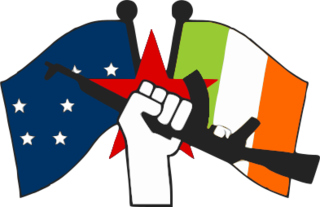
The Irish National Liberation Army is an Irish republican socialist paramilitary group formed on 10 December 1974, during the 30-year period of conflict known as "the Troubles". The group seeks to remove Northern Ireland from the United Kingdom and create a socialist republic encompassing all of Ireland. With membership estimated at 80–100 at their peak, it is the paramilitary wing of the Irish Republican Socialist Party (IRSP).
Michael McKevitt was an Irish republican and paramilitary leader. He was the Provisional Irish Republican Army's Quartermaster General. Due to the Provisional IRA's involvement in the Northern Ireland peace process, he formed the Real IRA in protest. His role in the Real IRA led to him being convicted of directing terrorism as the leader of the paramilitary organisation.

The 1981 Irish hunger strike was the culmination of a five-year protest during the Troubles by Irish republican prisoners in Northern Ireland. The protest began as the blanket protest in 1976, when the British government withdrew Special Category Status for convicted paramilitary prisoners. In 1978, the dispute escalated into the dirty protest, where prisoners refused to leave their cells to wash and covered the walls of their cells with excrement. In 1980, seven prisoners participated in the first hunger strike, which ended after 53 days.

Armagh Prison in Armagh, Northern Ireland, is a former prison. The construction of the prison began in 1780 and it was extended in the style of Pentonville Prison in the 1840 and 1850s. For most of its working life Armagh Gaol was the primary women's prison in Ulster. Although the prison is often described as Armagh Women's Gaol, at various points in its history, various wings in the prison were used to hold male prisoners.
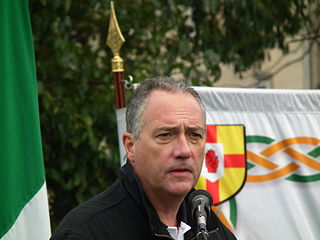
Séanna Walsh or Séanna Breathnach is a Sinn Féin member of Belfast City Council and a former volunteer in the Provisional Irish Republican Army (IRA).
The blanket protest was part of a five-year protest during the Troubles by Provisional Irish Republican Army (IRA) and Irish National Liberation Army (INLA) prisoners held in the Maze prison in Northern Ireland. The republican prisoners' status as political prisoners, known as Special Category Status, had begun to be phased out in 1976. Among other things, this meant that they would now be required to wear prison uniforms like ordinary convicts. The prisoners refused to accept that they had been administratively designated as ordinary criminals, and refused to wear the prison uniform.

The dirty protest was part of a five-year protest during the Troubles by Provisional Irish Republican Army (IRA) and Irish National Liberation Army (INLA) prisoners held in the Maze Prison and a protest at Armagh Women's Prison in Northern Ireland.
Mairéad Farrell was a member of the Provisional Irish Republican Army (IRA). She was shot and killed by the British Army in Gibraltar on 6 March 1988.

Gerard Kelly is an Irish republican politician and former Provisional Irish Republican Army (IRA) member who played a leading role in the negotiations that led to the Good Friday Agreement on 10 April 1998. He is currently a member of Sinn Féin's Ard Chomhairle and a Member of the Northern Ireland Assembly (MLA) for North Belfast.
Kieran Nugent was an Irish volunteer in the Provisional Irish Republican Army (IRA) and best known for being the first IRA 'blanket man' in the Maze Prison in Northern Ireland. When sentenced to three years for hijacking a bus, Nugent refused to wear a prison uniform and said the prison guards would have to "...nail it to my back".
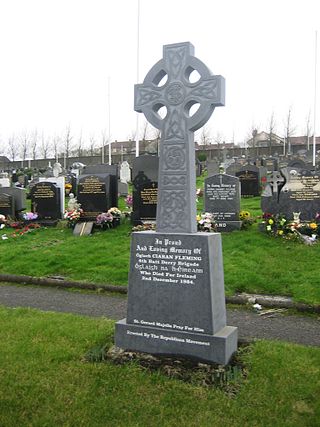
Kieran or Ciarán Fleming, was a volunteer in the 4th Battalion, Derry Brigade of the Provisional Irish Republican Army (IRA) from the Waterside area of Derry, Northern Ireland. He died while attempting to escape after a confrontation with British troops in 1984.
Events during the year 1976 in Northern Ireland.
The Maze Prison escape took place on 25 September 1983 in County Antrim, Northern Ireland. HM Prison Maze was a maximum security prison considered to be one of the most escape-proof prisons in Europe. It held prisoners suspected of taking part in armed paramilitary campaigns during the Troubles, with separate wings for loyalists and for republicans. In the biggest prison escape in UK history, 38 Provisional Irish Republican Army (IRA) prisoners escaped from H-Block 7 (H7) of the prison. One prison officer died of a heart attack during the escape and twenty others were injured, including two who were shot with guns that had been smuggled into the prison.
Laurence McKeown is an Irish author, playwright, screenwriter, and former volunteer in the Provisional Irish Republican Army (IRA) who took part in the 1981 Irish hunger strike.
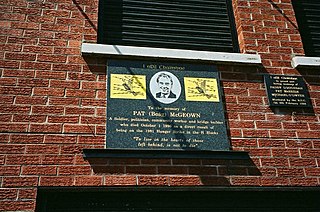
Pat "Beag" McGeown was a volunteer in the Provisional Irish Republican Army (IRA) who took part in the 1981 Irish hunger strike.
Jackie "Teapot" McMullan is a former volunteer in the Provisional Irish Republican Army (IRA) who took part in the 1981 Irish hunger strike.
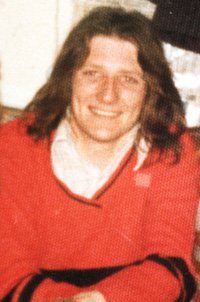
Robert Gerard Sands was a member of the Provisional Irish Republican Army (IRA) who died on hunger strike while imprisoned at HM Prison Maze in Northern Ireland. Sands helped to plan the 1976 Balmoral Furniture Company bombing in Dunmurry, which was followed by a gun battle with the Royal Ulster Constabulary. Sands was arrested while trying to escape and sentenced to 14 years for firearms possession.

Pat Sheehan is an Irish Sinn Féin politician, and former Provisional Irish Republican Army hunger striker at the Maze Prison.
The 1980–1981 Armagh Prison Dirty Protest occurred at the all-women Armagh Prison in Northern Ireland, where prisoners refused to bathe, use the lavatory, empty chamber pots, or clean their cells. This resulted in unsanitary conditions and increased abuse at the hands of the prison guards. The protest borrowed tactics previously used by male Irish republican prisoners in Long Kesh Prison, that had started in 1978.
References
- ↑ Kieran McEvoy (2001), Paramilitary imprisonment in Northern Ireland: Resistance, management and release, p.216. Oxford University Press
- ↑ "The Troubles, 1963 to 1985".
- ↑ McEnvoy, Kieran (2001). Paramilitary Imprisonment in Northern Ireland: Resistance, Management, and Release. Oxford University Press. p. 127. ISBN 9780198299073.
- ↑ Walker, Clive (1984). "Irish Republican Prisoners - Political Detainees, Prisoners of War or Common Criminals?". Irish Jurist. 19 (2): 197. JSTOR 44027778.
- ↑ Whalen, Lachlan (2008). Contemporary Irish Republican Prison Writing. Palgrave Macmillan. p. 57. ISBN 978-1403981936.
- ↑ "Hansard Commons Chamber Volume 840: debated on Thursday 6 July 1972". hansard.parliament.uk. Retrieved 13 August 2021.
- ↑ Melaugh, Dr Martin. "CAIN: Report of a Committee to consider, in the context of civil liberties and human rights, measures to deal with terrorism in Northern Ireland". cain.ulst.ac.uk.
- ↑ "Northern Ireland Prison Service". Archived from the original on 9 August 2006.
- ↑ O'Donnell, Ruán (2015). Special Category: The IRA in English Prisons Vol.2: 1978-85. Irish Academic Press. p. 277. ISBN 978-0-7165-3301-6.